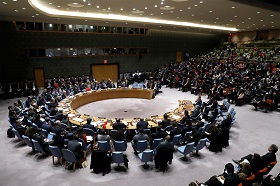US hospitality as regards the UN has been inconsistent and accompanied by many reservations from the very start. Wherever the General Assembly adopted an anti-American resolution or the United States found itself in the minority in the Security Council, people in Washington resumed the debate on whether participation in the UN met the national interests. Donald Trump was born and has lived all his life in New York but he has never idolized the UN. Having become US President, he immediately urged reducing the US contribution to the UN budget. Now Washington’s debt to the UN runs into billions of dollars. Trump initiated the US withdrawal from UNESCO and the UN Human Rights Council. Visa denials to representatives of UN member countries (not just Russia but Iran and Cuba as well) have become standard practice.
It is no surprise that these circumstances have revived the long-standing debates on the possibility of moving the UN to another location.
To begin with, any move would be very expensive. Changing the UN’s address would require huge costs for the UN, which is already enduring a chronic financial crisis. It does not even have enough money to properly maintain its current buildings let alone purchase new ones. Moreover, even a well-organized move is bound to paralyze some UN activities for a long time. Can the UN afford this in the current circumstances?
In addition, relocation of UN headquarters from the East River would be a big slap in the face to Donald Trump, who would not take it lightly. The US could make further moves to undermine UN status and potential, including even threaten to withdraw from the organization.
Finally, it is important not to underestimate the likely resistance from the UN bureaucracy. A large portion of the employees at UN headquarters would not leave this wonderful city even after completing their contracts with the UN: for them working at the UN is an ideal opportunity to plant roots in the United States.
Paraphrasing an old joke, we could say that moving the UN from New York to another place is the same as trying to move a cemetery. First, it is too expensive; second, it is technically highly complicated; and, third, no active resident support is likely.
Since I once worked at the Soviet UN mission on East 67th Street in Manhattan, I know that not all New Yorkers are happy to have the UN Headquarters in their city. Of course, this institution promotes local patriotism, being yet another argument in the endless discussion on what city has the right to be called the capital of the world. But the long residency of rich East River officials, who cause real estate prices to become ridiculously inflated… These arrogant foreign diplomats that impudently violate parking rules… These presidents, prime ministers, and kings with their entourages and security guards that come to the UN General Assembly every year turn the lives of Manhattanites into a real nightmare.
US hospitality as regards the UN has been inconsistent and accompanied by many reservations from the very start. Wherever the General Assembly adopted an anti-American resolution or the United States found itself in the minority in the Security Council, people in Washington resumed the debate on whether participation in the UN met the national interests. Donald Trump was born and has lived all his life in New York but he has never idolized the UN. Having become US President, he immediately urged reducing the US contribution to the UN budget. Now Washington’s debt to the UN runs into billions of dollars. Trump initiated the US withdrawal from UNESCO and the UN Human Rights Council. Visa denials to representatives of UN member countries (not just Russia but Iran and Cuba as well) have become standard practice.
It is no surprise that these circumstances have revived the long-standing debates on the possibility of moving the UN to another location. There are different suggestions in this regard, including to move just some of the agencies, such as the UN Disarmament Commission or the First and Sixth Committees of the General Assembly, or maybe the entire UN infrastructure with the national missions, the many sections and auxiliary services, and the New York staff.
The first option is not so difficult to implement, provided that the majority of UN members take a decision to this effect. But meeting the latter challenge at the present time seems practically impossible.
To begin with, any move would be very expensive. Changing the UN’s address would require huge costs for the UN, which is already enduring a chronic financial crisis. It does not even have enough money to properly maintain its current buildings let alone purchase new ones. Moreover, even a well-organized move is bound to paralyze some UN activities for a long time. Can the UN afford this in the current circumstances?
In addition, relocation of UN headquarters from the East River would be a big slap in the face to Donald Trump, who would not take it lightly. The US could make further moves to undermine UN status and potential, including even threaten to withdraw from the organization. Needless to say, nobody wants to provoke Trump. Besides, it would be difficult to find a new place that would be acceptable to everyone under today’s conditions of growing global polarization. The inevitable debates on a new UN location are most certain to continue for years.
Finally, it is important not to underestimate the likely resistance from the UN bureaucracy. For many of these officials, proposals to leave their comfort zone is no more tempting than the idea that the Moscow officials should move from the capital’s historical center to a remote neighborhood in New Moscow. Incidentally, a large portion of the employees at UN headquarters would not leave this wonderful city even after completing their contracts with the UN: for them working at the UN is an ideal opportunity to plant roots in the United States. So, a desperate bureaucratic sabotage of any move is as good as guaranteed.
Paraphrasing an old joke, we could say that moving the UN from New York to another place is the same as trying to move a cemetery. First, it is too expensive; second, it is technically highly complicated; and, third, no active resident support is likely.
Впервые опубликовано на сайте Международного дискуссионного клуба «Валдай».







